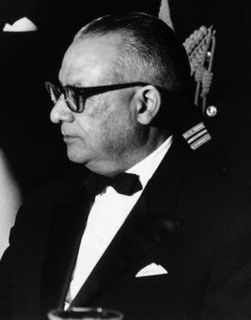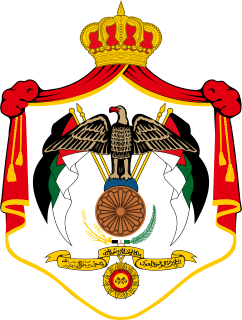
Parliamentary elections were held in Greece on 11 December [O.S. 28 November] 1910, following elections in August. The Liberal Party won 307 of the 362 seats. Eleftherios Venizelos remained Prime Minister, having assumed office on 18 October.

General elections were held in El Salvador on 20 March 1994, with a second round of the presidential elections taking place on 24 April. Armando Calderón Sol of the Nationalist Republican Alliance won the presidential elections, whilst his party also won the legislative elections. Voter turnout was 50% in the first round of the presidential elections and 45.5% in the second, whilst it was 53.1% for the legislative election.

Parliamentary elections were held in Poland on 8 September 1935, with Senate elections held a week later on 15 September. They were held under the April Constitution, drawn up earlier in 1935 by the Sanation movement, which structured the election rules in its favor. In protest, the election was boycotted by opposition factions, and voter turnout was only 45.9%, the lowest in the history of the Second Republic.

General elections were held in Venezuela on 1 December 1963. The presidential elections were won by Raúl Leoni of Democratic Action, who received 32.8% of the vote, whilst his party won 66 of the 179 seats in the Chamber of Deputies and 22 of the 47 seats in the Senate. Voter turnout was 92.3% in the presidential election and 90.8% in the Congressional elections.

General elections were held in Venezuela on 7 December 1958. The presidential elections were won by Rómulo Betancourt of Democratic Action, who received 49.2% of the vote, whilst his party won 73 of the 132 seats in the Chamber of Deputies and 32 of the 51 seats in the Senate. Voter turnout was 94.4% in the presidential election and 92.1% in the Congressional elections.

Parliamentary elections were held in Norway on 17 October 1927. The result was a victory for the Labour Party, which won 59 of the 150 seats in the Storting.

Parliamentary elections were held in Norway in 1891. The result was a victory for the Liberal Party, which won 63 of the 114 seats in the Storting. The Conservative Party and the Moderate Liberal Party contested the elections in an alliance, although separate lists were used in some constituencies.

General elections were held in Turkey on 21 July 1946, the first multi-party elections in the country's history. The multiple non-transferable vote electoral system was used. The result was a victory for the Republican People's Party, which won 395 of the 465 seats.

General elections were held in Jordan on 29 August 1951. As political parties were banned at the time, all candidates ran as independents, although some affiliated with the Jordanian Communist Party, the Ba'ath Party the Arab Constitutional Party and the Umma Party all won seats.

General elections were held in Mexico on 4 July 1982. The presidential elections were won by Miguel de la Madrid, who received 74.3% of the vote. In the Chamber of Deputies election, the Institutional Revolutionary Party won 299 of the 372 seats, as well as winning 63 of the 64 seats in the Senate election. Voter turnout was 74.8% in the presidential election and 72.6% and 66.4% for the two parts of the Chamber elections.

Parliamentary elections were held in Bulgaria between 6 and 27 March 1938, the first after the 1934 coup. The elections were held on a non-partisan basis, with the Bulgarian Agrarian National Union and Bulgarian Communist Party banned. Pro-government candidates won a majority of seats. Voter turnout was 69.5%.

Parliamentary elections were held in Greece on 21 August [O.S. 8 August] 1910. The United Parties won 211 of the 362 seats. Eleftherios Venizelos became Prime Minister on 18 October, and early elections were held in November.

Parliamentary elections were held in Hungary on 28 and 29 May 1939. The result was a victory for the Party of Hungarian Life, which won 181 of the 260 seats in Parliament. Pál Teleki remained Prime Minister. It won 72 percent of the parliament's seats and won 49 percent of the popular vote in the election. This was a major breakthrough for the far-right in Hungary.

General elections were held in Liechtenstein on 29 April 1945. Following the "silent elections" of 1939, they were the first to use the new proportional representation system. The Progressive Citizens' Party won eight of the 15 seats in the Landtag, but remained in coalition with the Patriotic Union.

General elections were held in Brazil on 3 October 1994. The presidential elections were won by Fernando Henrique Cardoso of the Brazilian Social Democracy Party, who received 54.3% of the vote. Cardoso won the election by a margin of 27.3%, the largest in Brazilian history to date, and the first of his two landslide victories. The Brazilian Democratic Movement Party remained the largest party in the Chamber of Deputies and the Senate.

General elections were held in Portugal on 28 April 1918, following a coup by Sidónio Pais in December 1917. The elections were boycotted by the Democratic Party, the Evolutionist Party and the Republican Union, who had won over 90% of the seats in the 1915 elections.

Parliamentary elections were held in Portugal on 11 May 1919. The three main parties that boycotted the 1918 elections returned to contest the elections. The result was a victory for the Democratic Party, which won 86 of the 163 seats in the House of Representatives and 36 of the 71 seats in the Senate.

Parliamentary elections were held in Portugal on 8 November 1925. The result was a victory for the Democratic Party, which won 83 of the 163 seats in the Chamber of Deputies and 39 of the 70 seats in the Senate. With a military coup the following year and the subsequent Estado Novo period, they were the last truly multi-party elections in the country until the 1975 Constituent Assembly election.

Parliamentary elections were held in Portugal on 16 December 1934, the first following the establishment of the one-party state known as the Estado Novo. The National Union was the only party to contest the elections, and no opposition candidates were allowed to run. It subsequently won all seats in the National Assembly, three of which were taken by women.
Folketing elections were held in Denmark on 14 November 1873. The result was a narrow victory for the Højre Coalition, which won 51 of the 101 seats. Ludvig Holstein-Holsteinborg remained Prime Minister following the elections.





















